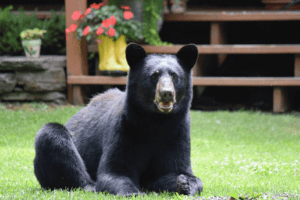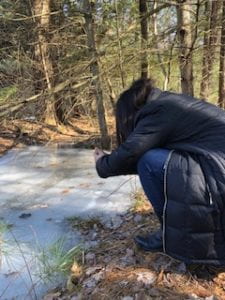Mission
Our goal is to build an open, collaborative wildlife monitoring project that engages local community members and answers questions about the changing mammal distribution patterns across Massachusetts. We seek to do so by providing educational information about local wildlife, working with community participants to collect various forms of sightings data, and collaborating with local schools and organizations. We believe that inclusive and effective scientific practice must actively engage with individuals across a diverse range of experiences and perspectives; and our initiative constantly grows and evolves through contributions from all levels of participation in the project.
What We Do
MassMammals Watch is a project dedicated to enhancing our current knowledge on the population distribution and behavior of mammals across Massachusetts. Our goal is to collaborate with the local community to learn about mammals in the area.

Another project we are working on, MassBears, is focused primarily on the abundance and distribution of black bears. We are looking to accumulate more data to better understand where bears are concentrated, as well as how the population changes throughout the area. During the summer field season, we used hair corrals to collect samples of black bear hair which we then extracted the DNA from the hair samples to identify individual bears. We are using this data to get a population estimate for black bears in the state. With your help, we will be able to collect more data that will enable us to study how these animals are interacting with urban environments.

We are also interested in learning about other mammals known to inhabit Massachusetts, such as the moose and the coyote. Because collecting hair samples from all the mammals in Massachusetts would be incredibly difficult, this is where you come in! We aim to utilize citizen/community science to answer our questions through tasks as simple as noting where they see animal tracks. We would love to have your help!
In addition, we are working with educators to bring citizen/community science into the classroom. Engaging young students in ecological research gives them the agency to get involved with helping the environment and, in a broader sense, think critically and actively about the world around them. Visit our page for educators to learn more about how we are involving students in our project!
How To Get Involved
Any data you contribute will be valuable to our project. Simply by reporting your sightings, responding to our questionnaires, spotting, or trapping, we can localize where mammals are and aren’t being seen.
Fill out this Volunteer Form and sign up for our newsletter to get involved!
There are a couple of ways to help:
- You can help us collect data on mammals in Massachusetts by submitting sightings of animals taken on your phone or camera as a spotter or as a trail camera user.
- If you are interested in our study on black bears in Massachusetts, visit our MassBears website for more details.

You must be logged in to post a comment.